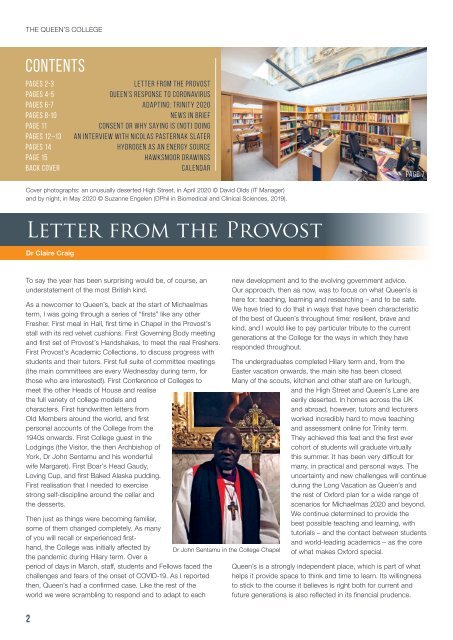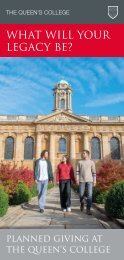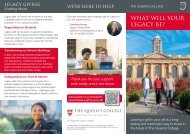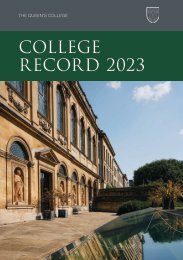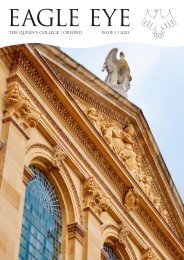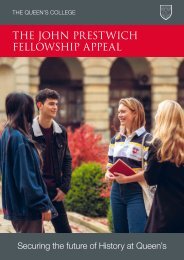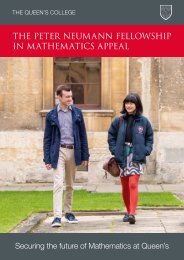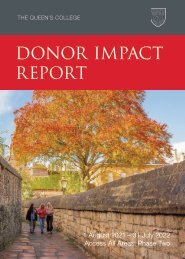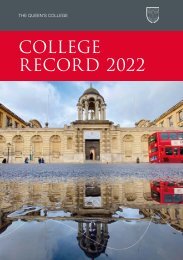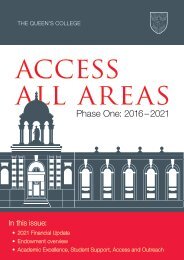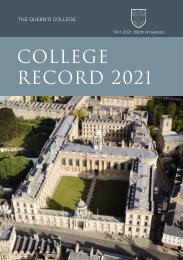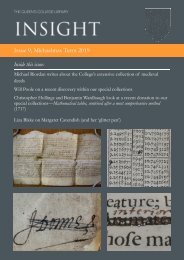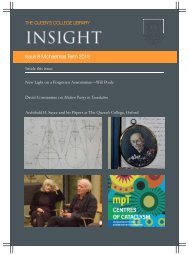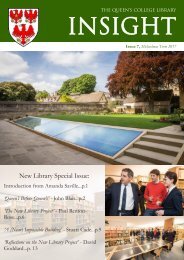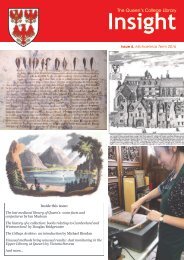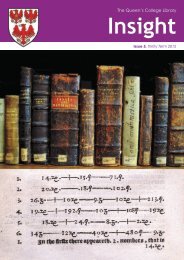The Queen's College Newsletter - Trinity Term 2020
This issue of our annual Newsletter looks at some of the COVID-19-related research carried out by members and the impact of lockdown on the College community. There is an interview with translator and Old Member, Nicolas Pasternak Slater, and articles on consent (by our Junior Research Fellow in Philosophy); hydrogen as an energy source; and the designs for rebuilding Queen's that were drawn up by Nicholas Hawksmoor in the eighteenth century.
This issue of our annual Newsletter looks at some of the COVID-19-related research carried out by members and the impact of lockdown on the College community. There is an interview with translator and Old Member, Nicolas Pasternak Slater, and articles on consent (by our Junior Research Fellow in Philosophy); hydrogen as an energy source; and the designs for rebuilding Queen's that were drawn up by Nicholas Hawksmoor in the eighteenth century.
Create successful ePaper yourself
Turn your PDF publications into a flip-book with our unique Google optimized e-Paper software.
THE QUEEN’S COLLEGE<br />
Contents<br />
pages 2-3<br />
Letter from the provost<br />
Pages 4-5<br />
QUEEN’S RESPONSE TO CORONAVIRUS<br />
Pages 6-7 ADAPTING: TRINITY <strong>2020</strong><br />
pages 8-10<br />
NEWS IN BRIEF<br />
Page 11<br />
Consent or Why Saying is (not) Doing<br />
pages 12–13 AN INTERVIEW WITH NICOLAS PASTERNAK SLATER<br />
pages 14<br />
Hydrogen as an Energy Source<br />
Page 15<br />
HAWKSMOOR DRAWINGS<br />
back cover<br />
calendar<br />
PAGE 7<br />
Cover photographs: an unusually deserted High Street, in April <strong>2020</strong> © David Olds (IT Manager)<br />
and by night, in May <strong>2020</strong> © Suzanne Engelen (DPhil in Biomedical and Clinical Sciences, 2019).<br />
Letter from the Provost<br />
Dr Claire Craig<br />
To say the year has been surprising would be, of course, an<br />
understatement of the most British kind.<br />
As a newcomer to Queen’s, back at the start of Michaelmas<br />
term, I was going through a series of “firsts” like any other<br />
Fresher. First meal in Hall, first time in Chapel in the Provost’s<br />
stall with its red velvet cushions. First Governing Body meeting<br />
and first set of Provost’s Handshakes, to meet the real Freshers.<br />
First Provost’s Academic Collections, to discuss progress with<br />
students and their tutors. First full suite of committee meetings<br />
(the main committees are every Wednesday during term, for<br />
those who are interested!). First Conference of <strong>College</strong>s to<br />
meet the other Heads of House and realise<br />
the full variety of college models and<br />
characters. First handwritten letters from<br />
Old Members around the world, and first<br />
personal accounts of the <strong>College</strong> from the<br />
1940s onwards. First <strong>College</strong> guest in the<br />
Lodgings (the Visitor, the then Archbishop of<br />
York, Dr John Sentamu and his wonderful<br />
wife Margaret). First Boar’s Head Gaudy,<br />
Loving Cup, and first Baked Alaska pudding.<br />
First realisation that I needed to exercise<br />
strong self-discipline around the cellar and<br />
the desserts.<br />
<strong>The</strong>n just as things were becoming familiar,<br />
some of them changed completely. As many<br />
of you will recall or experienced firsthand,<br />
the <strong>College</strong> was initially affected by<br />
the pandemic during Hilary term. Over a<br />
period of days in March, staff, students and Fellows faced the<br />
challenges and fears of the onset of COVID-19. As I reported<br />
then, Queen’s had a confirmed case. Like the rest of the<br />
world we were scrambling to respond and to adapt to each<br />
Dr John Sentamu in the <strong>College</strong> Chapel<br />
new development and to the evolving government advice.<br />
Our approach, then as now, was to focus on what Queen’s is<br />
here for: teaching, learning and researching – and to be safe.<br />
We have tried to do that in ways that have been characteristic<br />
of the best of Queen’s throughout time: resilient, brave and<br />
kind, and I would like to pay particular tribute to the current<br />
generations at the <strong>College</strong> for the ways in which they have<br />
responded throughout.<br />
<strong>The</strong> undergraduates completed Hilary term and, from the<br />
Easter vacation onwards, the main site has been closed.<br />
Many of the scouts, kitchen and other staff are on furlough,<br />
and the High Street and Queen’s Lane are<br />
eerily deserted. In homes across the UK<br />
and abroad, however, tutors and lecturers<br />
worked incredibly hard to move teaching<br />
and assessment online for <strong>Trinity</strong> term.<br />
<strong>The</strong>y achieved this feat and the first ever<br />
cohort of students will graduate virtually<br />
this summer. It has been very difficult for<br />
many, in practical and personal ways. <strong>The</strong><br />
uncertainty and new challenges will continue<br />
during the Long Vacation as Queen’s and<br />
the rest of Oxford plan for a wide range of<br />
scenarios for Michaelmas <strong>2020</strong> and beyond.<br />
We continue determined to provide the<br />
best possible teaching and learning, with<br />
tutorials – and the contact between students<br />
and world-leading academics – as the core<br />
of what makes Oxford special.<br />
Queen’s is a strongly independent place, which is part of what<br />
helps it provide space to think and time to learn. Its willingness<br />
to stick to the course it believes is right both for current and<br />
future generations is also reflected in its financial prudence.<br />
2


